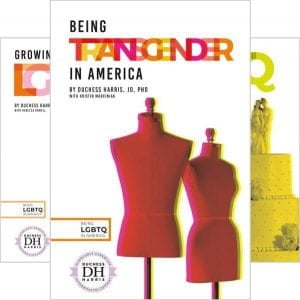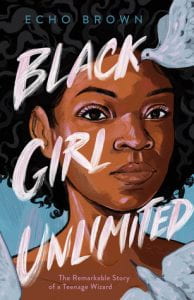 Being LGBTQ in America. Abdo Publishing, 2020. $25.95 ea. $155.70, set of 6. 112 pp. Grades 6-8.
Being LGBTQ in America. Abdo Publishing, 2020. $25.95 ea. $155.70, set of 6. 112 pp. Grades 6-8.
Harris, Duchess, J.D., Ph.D. with Rebecca Rowell. Growing Up LGBTQ. 978-1-532-11904-0.
Harris, Duchess, JD, PhD. with Kristin Marciniak. Being Transgender in America. 978-1-532-11903-3.
Harris, Duchess, JD, Ph.D. with Kristin Marciniak. LGBTQ Discrimination in America.978-1-532-11905-7.
Harris, Duchess, JD, Ph.D. with Martha Lundin. LGBTQ Rights and the Law. 978-1-532-11906-4.
Harris, Duchess, JD, Ph.D. with Jill C. Wheeler. LGBTQ Service in the Armed Forces. 978-1-532-11907-1.
Harris, Duchess, JD, Ph.D. with Martha Lundin. LGBTQ Social Movements in America. 978-1-532-11908-8.
This well-researched series provides an easily understandable, comprehensive exposition of the LGBTQ community, its difficulties, and its successes. In Growing Up LGBTQ, by Dr. Duchess Harris with Rebecca Rowell, the authors focus on LGBTQ teens navigating their gender identity with compelling language and plentiful real-life explanations. The book acts as a primer with each chapter covering a different issue facing LBGTQ and ending with brief list of discussion questions. An interesting topic is a description of stores that engage in “gendering materials,” separation of traditional boy and girl products like clothing and toy and heightened prices for “girl” toys. The authors list the various ways LBGTQ* teens suffer from discrimination in the health care field, among law enforcement, in the homeless community, and in prisons. This particular book reinforces the need for LBGTQ teens to feel the support of family and school in order to find their voices. It concludes with with a discussion of the protests and the consequences around Title IX, its advances and its demise under the Trump-deVose administration. Complementary photographs and informative textboxes interspersed touch on topics like microaggressions, same-sex marriage, and more. Though the slim volume doesn’t go in-depth on any topic, it does give a lively, simple overview of being a LGBTQ teen. Includes a glossary, suggested resources, and an index.
THOUGHTS: Middle-school students as well as reluctant high school readers doing research papers or projects will make good use of these short, information-packed books. They also will benefit gender-curious youth because the authors don’t seem to have missed any issue. Being LGBTQ+ and a person of color and asexuality are also briefly addressed. I wonder if the title will be revised to read LGBTQ+.
306.76 Social Sciences Bernadette Cooke, School District of Philadelphia

